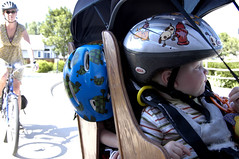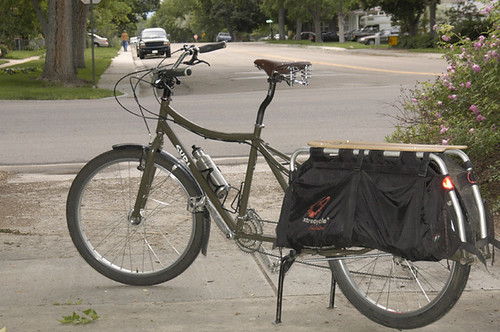Yesterday was our two year anniversary of going carfree, all of which has been tracked here on this blog. That being said, I figured it was appropriate to post some thoughts on that time, as well as some thoughts regarding this blog.
Overall, our experience has been very good in the two years since we sold our last car. I won't pretend that there haven't been some challenging moments along the way, or a couple times when in a fit of frustration car ownership crept back in as a thought. Everything has its moments.
When we first sold our car, it was partially to make a statement about the need for societal change towards more sustainable methods. It was also partially because we felt that in order to be a part of the solution in figuring out more sustainable ways to live in suburban America we needed to cut the cord so to speak, and go all out. We also wanted to take away people's typical excuses and we knew that owning a car even if we didn't drive it would be something of an out for people in how they viewed our lifestyle.
I certainly don't want to give the impression that we're out to make anyone feel bad for their current lifestyle, but we do want to show unapologetically that another way is not only possible, but also profitable, and hopefully in that process encourage others to take steps of their own. We are all on this journey together, simply at different phases in the process of sustainable living.
We started this blog back when we were learning how to apply car lite living to parenthood. I'd been car free when we got married, and Nickie and I both tended to get around largely by bike up until our first child, but felt a bit like we were starting over once kiddo #1 came onto the scene, then the next challenge was not just how to get out by bike with kids, but how to actually displace errands. This blog was and is about trying to figure this, within the greater picture of sustainable living, out collectively. Basically its about being part of an open source society, where we share our ideas and resources and try to figure this new way of living out together. Hopefully our blog has been and will continue to be an encouragement and source of info from time to time on how to make this lifestyle work.
Below are some things we've learned in this time.
1)Cargo bikes and electric assists can be real lifesavers with mediocre mass transit plus kids. Nickie and I have been tremendously grateful for cargo bikes currently on the market. We have two young kids too close together in age for one to be vastly further ahead regarding what he can contribute than the other which means, at this point they are both cargo, when you add long distances, diaper bag, groceries etc. Cargo bikes and electric assists become a tremendous commodity. There are also the times when one of us is sick, but still needs to cover a great distance, or when Nickie was injured last year, and I was toting her on the back of the bike plus the kids in the trailer, for 1.5 months.
2)Living carfree in suburban America requires a pretty significant mindset change. We've blogged about this before, but your world becomes smaller and bigger at the same time. You may not stray far and wide as you do with a car, but because you see so much more and experience the world in a different way, your local world seems bigger. The other big shift along these lines is thinking differently about seasons and weather. We've become much more seasonally adaptive, keeping our thermostat at 60-62 in the winter during the daytime, and letting temps get into the high 70's to 80 in our house during the summer, and adjusting more to the seasons as we're consistently exposed to them.
3)Living carfree is very healthy for our kids. They are much more engaged with their surroundings and as we now take steps with our older child to involve him more in the process of getting around (tag alongs, sitting on the rear rack/deck) it seems to have a very positive effect on maturity and self esteem to have more responsibility and to be able to contribute in some way to something Mom and Dad do. They are also much more in touch with their surroundings which can only be good. They see so much more, smell so much more, notice so much more than when they go someplace via car. Being able to snuggle your kids on the bus and read a book together is also so much nicer than sticking them in a car seat in the back seat of a car.
4)Living carfree with kids in suburban USA requires a VERY flexible attitude, and A LOT of creativity. We are not advocating via this blog that all folks go carfree, but that they do endeavor to live carlite. Like most things there is a point of diminishing returns. Living 80% carfree is VERY doable, going the next 20% up to totally car free requires at least as much effort if not more than the first 80%. Does that mean we don't think its worth it, well, thats a question only the individual can answer, but as we've said, we'd rather figure it out all the way, so that most can more easily go that 80% than not. Besides we've found there are few experiences that we don't enjoy more by bike than we did by car.
5)While it is true that biking does save money over driving a car, it takes time and initial investment before you begin to see the returns on it. Buying and/or building setups for toting kids in all condition with the ability to do errands year round with our wild climate variations, has not been what I would call cheap. It has certainly been cheapER than car ownership. Here's some perspective. My wife and I had one car as I was car free when we got married, we maintained that model up until going car free as I typically bike commuted. The one car we had was paid for, and I did most of the repairs myself, and our insurance was cheap. Back in the day when gas cost $1.80/gal we generally spent around $3,500 a year on car ownership. In the two years since going carfree we have spent around $2,500 out of pocket a year on transportation. I would say we are now getting to the point where that will settle down to about half to 1/3rd of that amount. The most complicated solutions are now paid for, and henceforth, its kids bikes and maintaining our current fleet.
6)Carshare's a great model of car ownership for the coming generations.
7)Relax and enjoy the journey.
8)Know that you really don't know it all... :)

